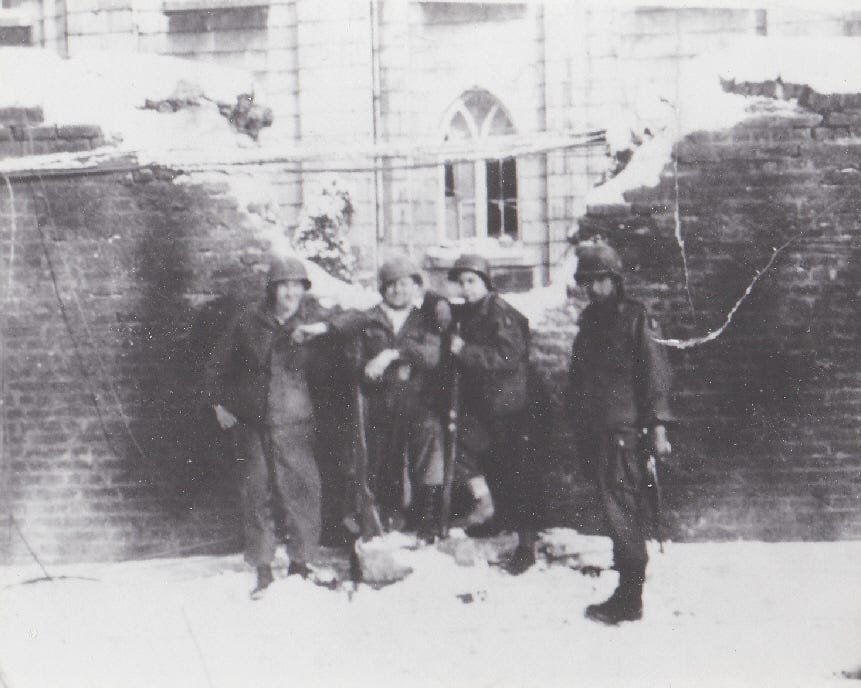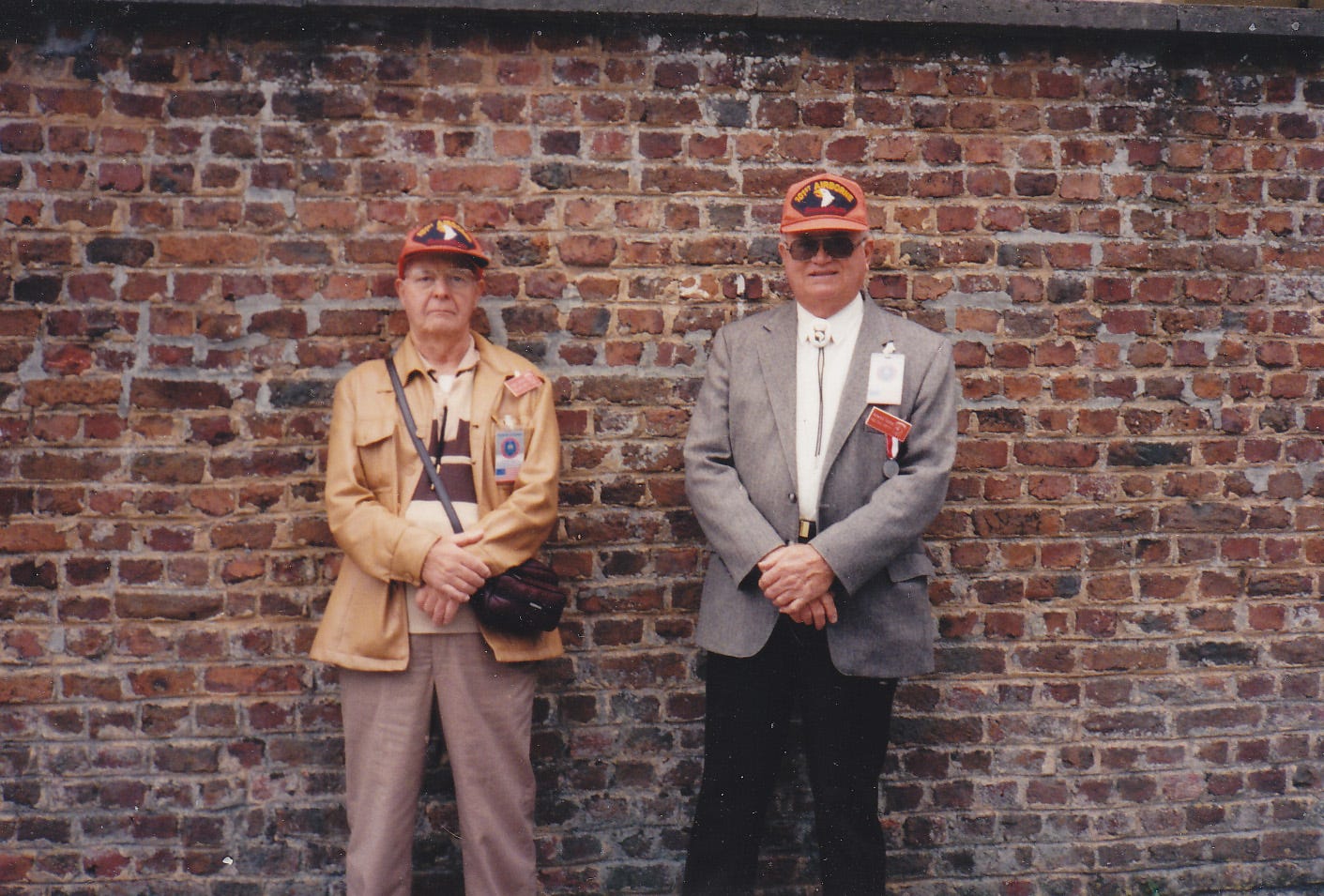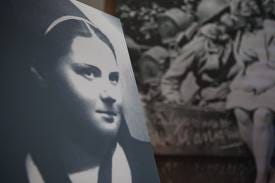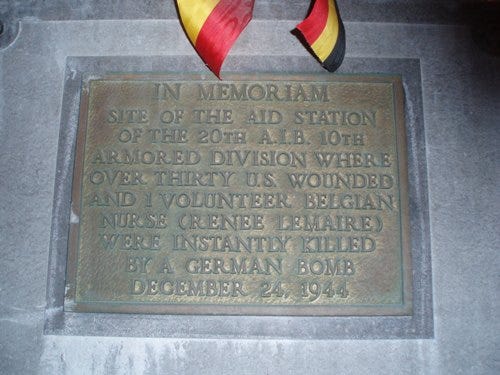Although I’m watching Band of Brothers for the first time, the mini-series is bringing to life several moments from my interviews and conversations with veterans of the 101st Airborne Division, along with some from the 82nd Airborne, although they were not portrayed in the series.
“Goodbye old buddy.”
The scene in Episode 6, Bastogne, in which Easy Company waits in their foxholes, staring at the woods across open snow-covered terrain, having been told an attack is headed their way, reminded me of my interview with Maurice Tydor, who was a radio operator in division artillery of the 101st.
I had asked if having been in Bastogne gave him a sense of being a part of history.
“Yes,” he said. “At the time we didn’t realize it. It was more or less fatalistic. It was something where we were supposed to die, so long old buddy, there was no hope and we accepted the fact, hey, I’m gonna die, I’m so young and this is gonna happen. But I didn’t die. I said, gee, if anything happens now, I’m not gonna let anything bother me. And you know what? Two weeks later, anything bothered me. So you’re fatalistic off and on. But we were supposed to hold off the whole German army. Even when they were moving to a more secure place, and we said whoever’s turn comes up that one is gonna be where the Germans were supposed to come through, and my turn came up. Fortunately they didn’t come through and I didn’t get killed.”
That’s Maurice in the photo above, on the far right. The others are John Miller, Norwood Thomas and Ernest Landrum, although I don’t know the order. The four were standing behind wall when a German shell took that chunk out of it. In the photo below I’m pretty sure that’s John Miller on the left and Norwood Thomas, at the same wall.
Tydor was about 100 yards from General Anthony McAuliffe when he issued his famous response to the Germans’ demand that the Americans surrender: “Nuts.” This was mentioned in the episode.
In 1994 Tydor invited me to the annual “Nuts” dinner at West Point. I sat in the lounge with five 101st veterans, Len Goodgal, Frank Miller, John Miller (one of the veterans in the photo), Bill Druback and Mickey Cohen. One of them said, “He wants to hear about Bastogne.” They were not in Easy Company but all were in Bastogne.
“When did General McAuliffe get the ultimatum to surrender?” I asked.
“The 22nd (of December), Frank Miller said. “I looked it up because this guy had asked me for Newsday about it, and he caught me unaware, so I said, ‘It was just before Christmas, but I don’t remember the date.’ I checked it out in one of the books, and he had given out that letter that day.
“Yeah, ‘It’s Christmastime, and we’ve got to be thankful for…” Frank Miller said. “The 22nd was the day they gave it to him, and the Germans said, ‘Vas ist das?’ What does it mean?”
“He asked the guy,” John Miller said.
“‘What does it mean?’” Frank Miller said. “In those days I spoke German pretty good. My grandfather was German. McAuliffe asked the guy, ‘What should I tell him?’ He says, ‘Well, your answer before, Nuts. And that’s how he responded. He said, ‘Aw, nuts. What should I answer him?’ the guy (then-Lieutenant Colonel Harry Kinard) said, ‘You’ve got it: Nuts.’”
The moment is described more eloquently in Lieutenant General Harry W.O. Kinnard’s obituary in the New York Times, under the headline “Harry Kinnard, who said One Word Would Do, dies at 93” on Jan. 10, 2009.
General Kinnard parachuted into Normandy in the first hours of D-Day. He received the Distinguished Service Cross for heroism during Operation Market Garden, the airborne attack in the German-occupied Netherlands. And he helped pioneer the airmobile concept, sending troops into combat aboard helicopters during the Vietnam War.
But he was perhaps best remembered for what happened in December 1944 at the Belgian town of Bastogne, where the 101st Airborne Division, short on clothing and boots in a snowstorm and bitter cold, was surrounded by German troops.
Bastogne, at the intersection of important roads, was a crucial objective for the Germans in their surprise attack in the Ardennes region of Belgium, an offensive that had created a “bulge” in Allied lines.
On Dec. 22, two German officers approached the American lines in Bastogne carrying a demand that the American commander surrender his troops within two hours or face annihilation from an artillery barrage.
The message was passed on to Brig. Gen. Anthony C. McAuliffe, acting as division commander while Maj. Gen. Maxwell D. Taylor was in Washington.
General Kinnard, a lieutenant colonel at the time and the division’s operations officer, would recall that General McAuliffe “laughed and said: ‘Us surrender? Aw, nuts.’ ”
As General Kinnard related it long afterward in an interview with Patrick O’Donnell, a military historian: “He pondered for a few minutes and then told the staff, ‘Well, I don’t know what to tell them.’ He then asked the staff what they thought, and I spoke up, saying, ‘That first remark of yours would be hard to beat.’
“McAuliffe said, ‘What do you mean?’ I answered, ‘Sir, you said, ‘Nuts.’ All members of the staff enthusiastically agreed. McAuliffe then wrote down: ‘To the German Commander, Nuts! The American Commander.’ ”
The note was carried back to the German officers by Col. Joseph Harper, a regimental commander. The officers did not seem to understand it, so Colonel Harper told them, “If you don’t know what ‘nuts’ means, in plain English it is the same as ‘go to hell.’ ”
The 101st held out, and four days later an American column broke through the German lines, lifting the siege. That response of “nuts” came to epitomize the grit of American soldiers in the face of seemingly overwhelming odds
In Band of Brothers, the nurse Anna has a brief romance with an Easy Company medic, and is killed when the convent where patients are being treated is bombed. It’s a bit of a Hollywood touch but a very moving one when the medic learns her fate by finding her blue head scarf amid the rubble, putting it in his pocket to remember her, and then taking it out and tearing it in half to treat a wounded trooper.
In 2005, while working at the Bergen Record, I accepted a fellowship sponsored by the newspaper to teach journalism for one semester at Syracuse University. While I was there, I attended a lecture at a nearby hospital by Dr. Jack Prior, who was a battalion surgeon in the 10th Armored Division. I caught one mention of the 10th Armored in Band of Brothers, as part of that division was also in Bastogne. After the lecture, I asked Dr. Prior if I could interview him. A few days later, I visited him at his home, accompanied by one of my students — I figured it would be a good experience for her, although I didn’t figure I would forget to turn on my tape recorder until ten minutes into the interview. Nevertheless.
The 10th Armored was in a different part of Bastogne and Dr. Prior had two adjacent buildings that were used as a hospital, while the 101st casualties were treated in the convent depictred in the series. The most serious cases in the 10th Armored sector were in one building and less serious injuries were in the other. He had two nurses, Renee Lemaire — the inspiration for the character of Anna — and Augusta Chiwy.
Renee Lemaire
Dr. Prior was about to enter the building with the most seriously wounded cases when one of the men in the medical detachment stopped him at the door asked if he knew what day it was. He said he didn’t.
“It’s Christmas Eve,” the medic said. His colleague produced a bottle of champagne and they each had a glass. Just then they heard the roar of planes overhead followed by the whistling of a bomb. He had experienced plenty of artillery but this was the first time he heard a bomb’s telltale whistling. A moment later, the bomb made a direct hit on the house with the seriously wounded patients. Dr. Prior said he believes Renee was in the basement when the was killed.
As busy as she was tirelessly caring for the wounded, he said, Renee would stop everything when she heard bundles of supplies being dropped by parachute. She would excuse herself and go outside, hoping to retrieve a parachute. She was engaged, he said, and hoped to use the silk to make a wedding dress. The parachute silk was used as her burial shroud.
And now a mea culpa. I often spot discrepancies in written histories, and my own work is sometimes quoted, so I try to be accurate. I misspelled a lot of names in transcripts of my early interviews because I didn’t realize they would one day be historical records — or that family members would be googling the veteran’s name. In my first Substack I erroniously said Francis “Snuffy” Fuller was the leader of the first platoon, Company C, 712th Tank Battalion. He was the leader of the second platoon.
Audio from the “Nuts” dinner conversation. Frank Miller tells how he was wounded in Holland.








